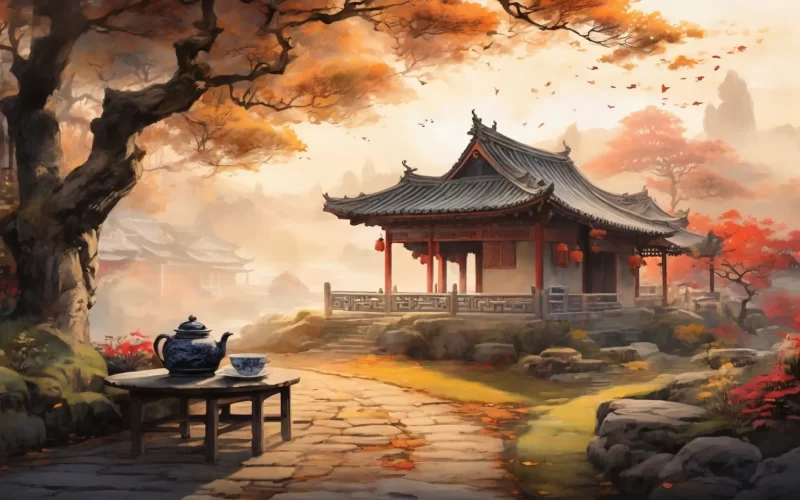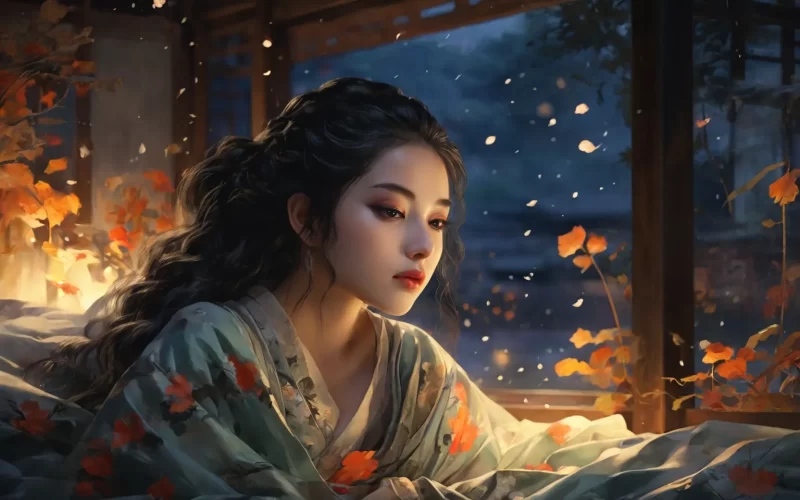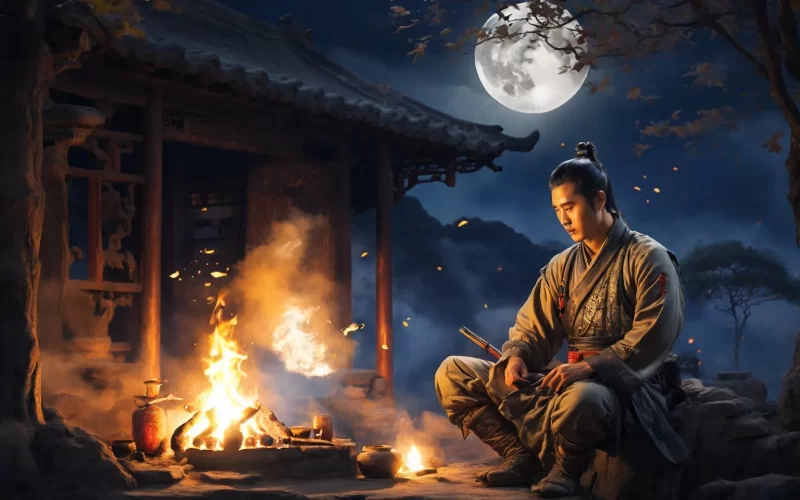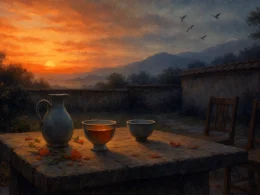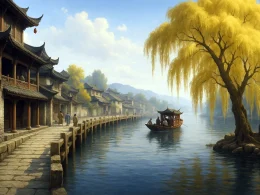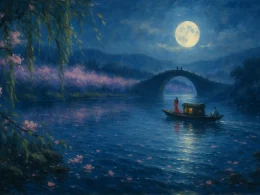To find you, moved beyond the city,
A wide path led me, by mulberry and hemp,
To a new-set hedge of chrysanthemums --
Not yet blooming although autumn had come.
...I knocked; no answer, not even a dog.
I waited to ask your western neighbour;
But he told me that daily you climb the mountain,
Never returning until sunset.
Original Poem
「寻陆鸿渐不遇」
僧皎然
移家虽带郭,野径入桑麻。
近种篱边菊,秋来未著花。
扣门无犬吠,欲去问西家。
报到山中去,归来每日斜。
Interpretation
This poem records the poet's unsuccessful visit to Lu Yu (courtesy name Hongjian), the renowned "Sage of Tea" who authored The Classic of Tea. Though residing near urban areas, Lu exemplified eremitic ideals through his devotion to tea cultivation and mountain solitude.
First Couplet: "移家虽带郭,野径入桑麻。"
Yí jiā suī dài guō, yě jìng rù sāng má.
Though his new home lies near the city wall, A rustic path through mulberry fields leads to his hall.
The opening lines establish the recluse's paradoxical existence - physically proximate to civilization yet spiritually detached through his chosen environment of mulberry fields and country paths.
Second Couplet: "近种篱边菊,秋来未著花。"
Jìn zhòng lí biān jú, qiū lái wèi zhuó huā.
Chrysanthemums by his fence stand in rows, Yet autumn comes and still no flower shows.
The chrysanthemums, traditional symbols of reclusion, remain curiously flowerless despite the season. This botanical anomaly suggests either the recluse's transcendence of conventional symbols or the visitor's inability to perceive his spiritual flowering.
Third Couplet: "扣门无犬吠,欲去问西家。"
Kòu mén wú quǎn fèi, yù qù wèn xī jiā.
No dog barks when I knock at his gate; To ask his neighbor I hesitate.
The silent courtyard, devoid even of a watchdog's greeting, emphasizes the depth of Lu's solitude. The poet's hesitation before inquiring with neighbors reveals his respect for the recluse's privacy.
Fourth Couplet: "报到山中去,归来每日斜。"
Bào dào shān zhōng qù, guī lái měi rì xié.
"He's gone to wander mountain trails alone, Returning only when the sun has flown."
The neighbor's response paints Lu as a true mountain sage, measuring his days by the sun's journey rather than human schedules. This final image completes the portrait of a man who has fully embraced the rhythms of nature over those of society.
Holistic Appreciation
With a light and natural touch, the poem depicts the poet's unsuccessful visit to a friend, yet subtly conveys his admiration and longing for the life of a recluse. Instead of directly portraying Lu Yu, the poem gradually unfolds his image—content in nature and indifferent to fame—through the serene surroundings, chrysanthemums yet to bloom, and the brief words of a neighbor. The language is simple, unconstrained by rigid parallelism, flowing with a leisurely and meditative quality that reflects Jiaoran's distinctive poetic style of "refined expression and profound insight."
Artistic Merits
This poem skillfully captures Lu Yu's detached and refined character through natural scenery and the sparse dialogue of a neighbor. Free from rigid couplets and written in an effortlessly fluid style, it exudes an air of ease and spontaneity. Jiaoran excels at "using scenery to depict people" and conveying ideals through objects. Without direct description, he fully expresses the recluse's nobility and transcendence through pastoral landscapes and the rhythm of mountain life, showcasing his unique poetic artistry.
Insights
The poem not only presents Lu Yu as a serene and unworldly hermit but also reflects the poet's pursuit of a transcendent life in harmony with nature. In today's restless and noisy world, this wisdom of "dwelling near the mundane yet rising above it" remains a thought-provoking and valuable philosophy.
Poem translator
Kiang Kanghu
About the poet
Jiaoran (720 – 800?), secular name Xie Qingzhou, was a mid-Tang dynasty Buddhist poet from Wuxing (modern-day Wuxing, Zhejiang Province) and a tenth-generation descendant of Xie Lingyun. Initially trained in Confucian classics, he took monastic vows in middle age and resided at Miaoxi Temple on Zhushan Mountain in Huzhou. His poetry harmonized Chan (Zen) philosophy with landscape imagery, and he pioneered the "theory of artistic conception" (意境论) in poetics, advocating for "elevated artistic realms." Associated with literary figures like Yan Zhenqing and Wei Yingwu, his poetic style epitomized ethereal tranquility. The Complete Tang Poems preserves 480 of his works—the largest corpus among Buddhist monk-poets.






